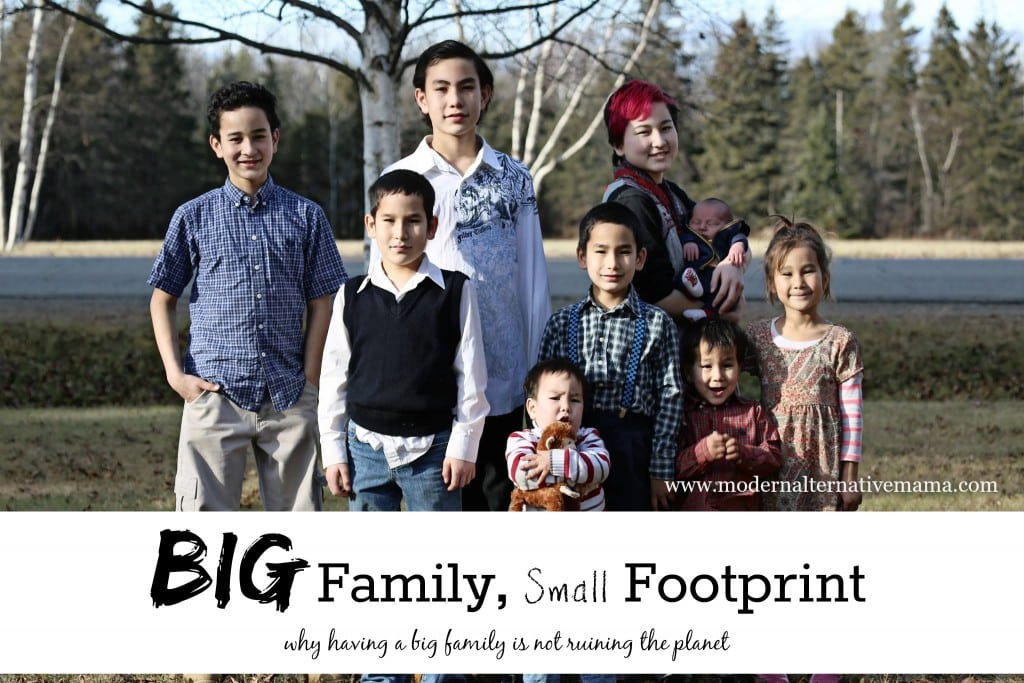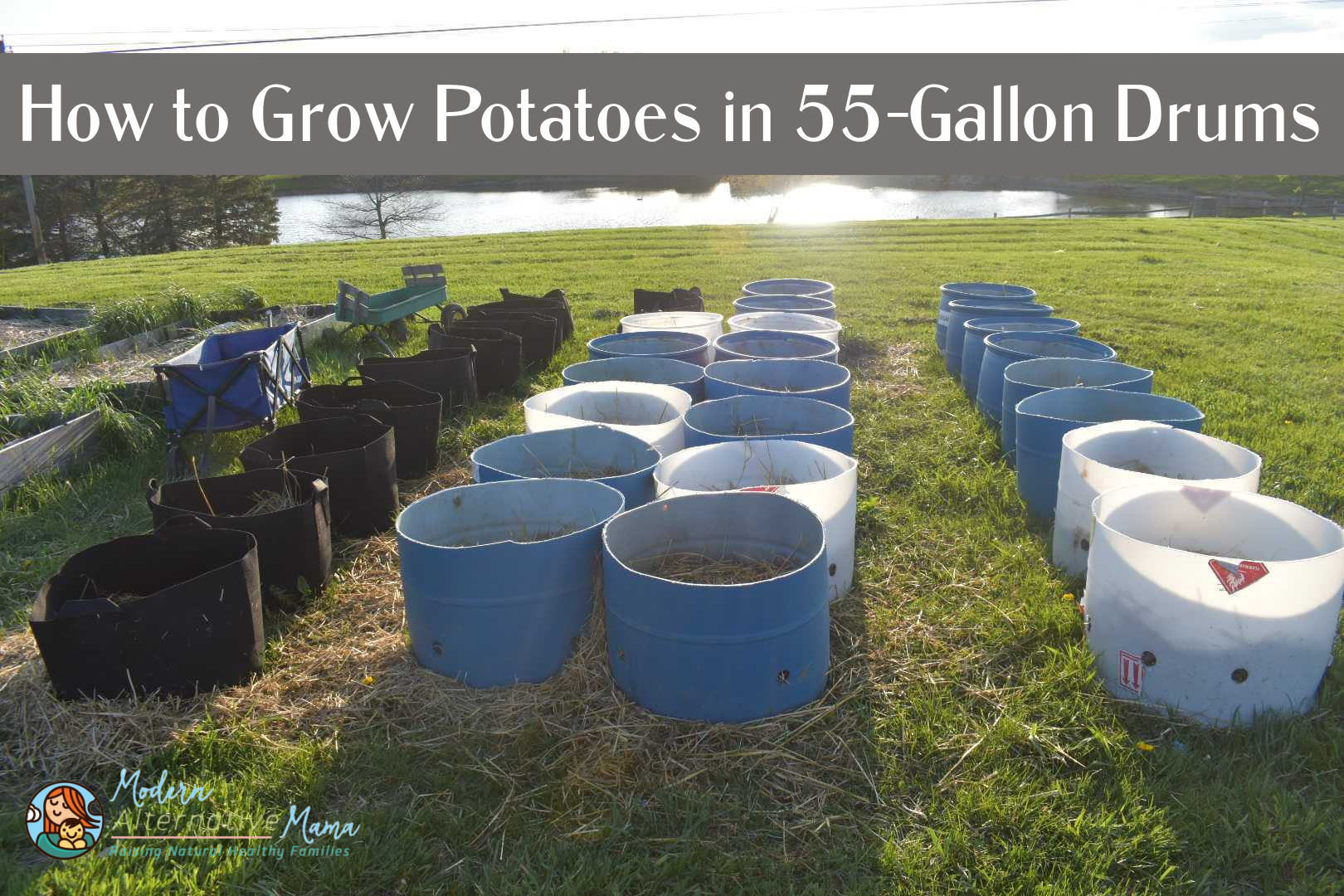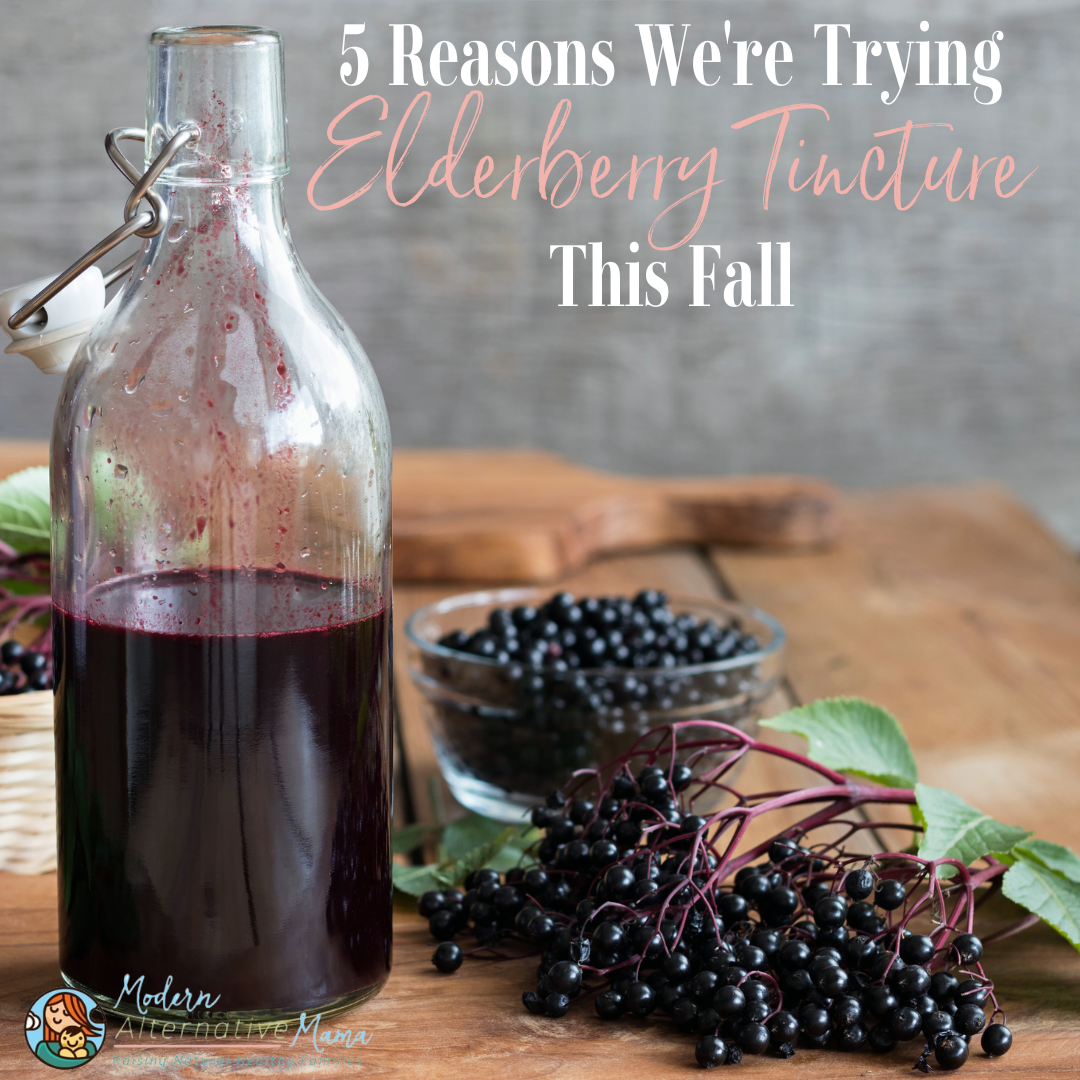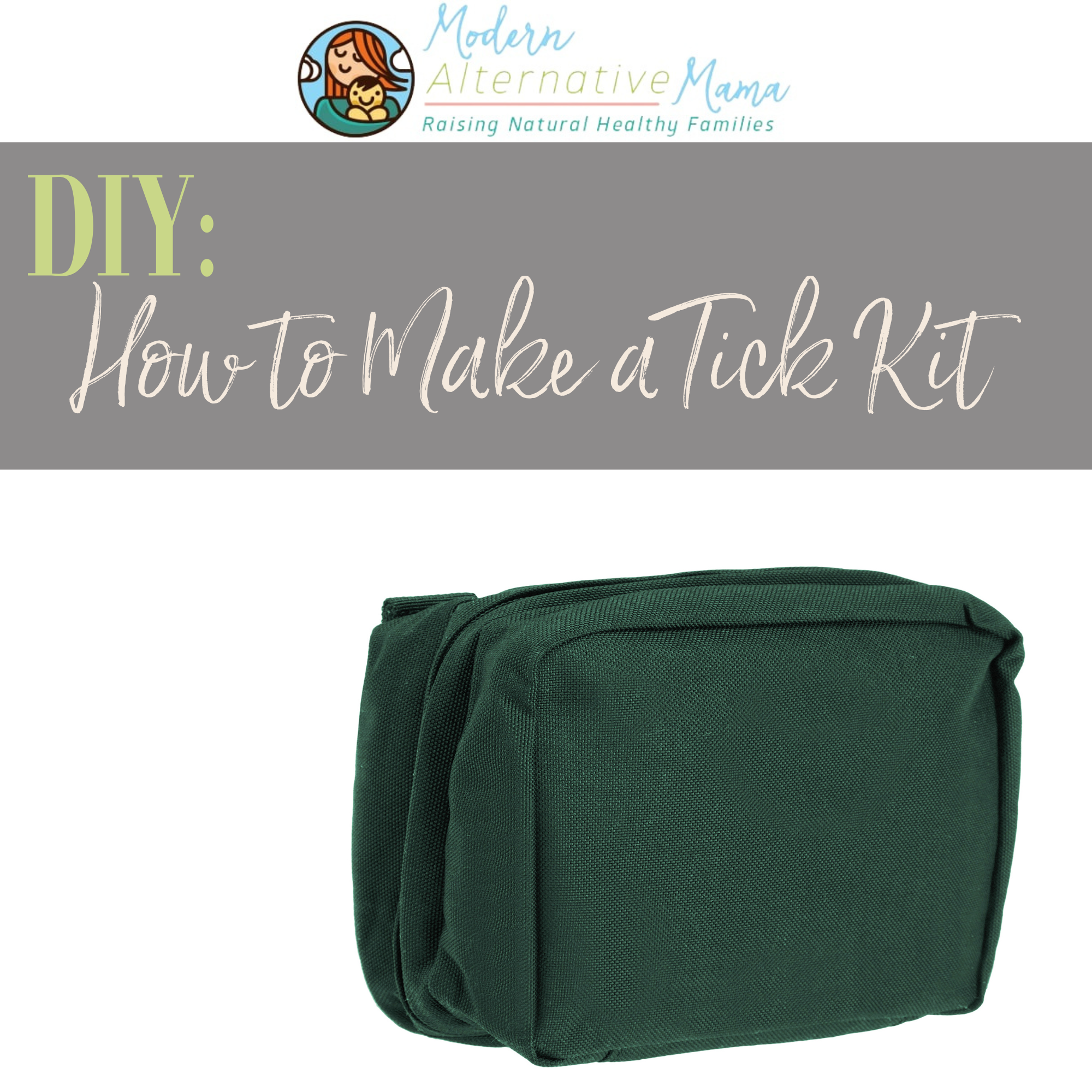Think big families use too many resources? Find out why having a big family is not ruining the planet.
By Daja, Contributing Writer
Last I counted I have nine children. Nine wonderfully loving, compassionate, clever, responsible children, who we hope and pray we are raising to be loving, compassionate, clever and responsible adults.
When we go out, of course, we get questions and stares and the timeless question, “How can you afford it?” and “You have your hands full!” It’s fine really. Most of the time we just smile or laugh. One comment that always gets my goat though is the assumption that by having a large family we are somehow damaging the earth and overusing our allotted resources.
Big Family, Small Footprint
This is especially irritating as it has most often come from someone drinking a wildly overpriced cup of non-fair trade non-organic coffee from a disposable cup or carrying their designer handbag made is a sweatshop in an exploited country or someone accustomed to driving alone in the carpool lane.
They may not like the message, but here it is: Our whole family of 11 likely consumes less resources than the average First World single person or childless couple. That’s just the truth. How is this possible?
1) We share practically everything and
2) We produce more than we consume.
Sharing Practically Everything
Example: Someone making a meal for one person can heat their oven, cook dinner for 1 hour and used approximately 2.0kWh of electricity. You cannot just multiply this to say that a family of 11 would use 22.0kWh of electricity. In the same amount of time, with the same amount of electricity it takes to feed one, I can feed my 11.
This goes for virtually everything. Clothes are not worn for just one season or for a year or for one person. They are shared around and passed down until they have fully served the noble purpose for which they were made.
We all sit in the same room in the evenings, sharing the electricity to read and play games together. Everyone does not simply disappear to their own rooms to hide in Netflix binges.
We share space in other ways as well. There is a boys’ room, a girls’ room, and a parents’ room. Any misguided feeling of entitlement to one’s “own room” melts away in the unselfishness of learning to accommodate others, communicate, and late night giggles.
The very nature of having a big family forces creativity and the kind of frugality that gives birth to eco-responsibility. If conviction and principle don’t inspire you to be earth-friendly, cost and convenience will. We don’t buy convenience food, fast food, or virtually anything that comes in little plastic packages. We buy flour that comes in 50-pound brown paper bags. Absolutely no waste–not even the packaging. We reuse and up-cycle everything possible. Our kids don’t have the latest plastic gadget toys that require batteries and upkeep. They play outside. With one another.
This is life. Nay, this is the good life.
Production vs. Consumption
I confidently propose the idea that we do not have a resource problem on the earth, but we definitely have a consumption problem.
According to the USDA it should cost me $304,480 to raise a child to the age of 18. [source] If you just take that at face value, it would cost me $2,740,320 to raise my brood. Being that I am not a Rockefeller, this would seem out of the realm of possibility. The sheer amount of resources is staggering.
But, these projections are largely calculated by calling “essential” things that are actually optional. Not every child requires hospital birth, new baby clothes, disposable diapers, formula, baby food, baby gear (e.g. crib, high chair, swings, strollers, etc.), special classes/clubs/schools, brand new clothes, electronic gadgets, etc.
Life in a big family often (usually?) includes thrift store shopping, hand-me-down clothing, carpooling, cooking from scratch, growing a garden, multi-use tools and rooms, minimizing waste and sharing resources.
This isn’t a drag. It really does not bum me out. I have learned to view my home and family as units of production and not units of consumption. I can say, “How much will it cost to have a family?” or rather “How much good will having a family produce?” I can say “How much will all these children eat?” or I can say, “Our goal this year is to grow more food than we consume so we can share with others.” Unrealistic? I don’t think so. In ages past, this was how it was. Families all produced something–produce, eggs, milk, art, music, community. Their focus was not on how much they would or could consume. They were forces for good in the world.
I can say without exaggeration that my large family forces a frugality that births a healthy eco-responsibility.
“…above all, [Radical Homemakers] were fearless. They did not let themselves be bullied by the conventional ideals regarding money, status, or material possessions. These families did not see their homes as a refuge from the world. Rather, each home was the center for social change, the starting point from which a better life would rippled out for everyone….More than simply soccer moms, Radical Homemakers are men and women who have chosen to make family, community, social justice and the health of the planet the governing principles of their lives. They reject any form of labor or the expenditure of any resource that does not honor these tenets. For about five thousand years, our culture has been hostage to a form of organization by domination that fails to honor our living systems, where “he who holds the gold makes the rules.” By contrast, Radical Homemakers use life skills and relationships as a replacement for gold, on the premise that he or she who doesn’t need the gold can change the rules. The greater our domestic skills, be they to plant a garden, grow tomatoes on an apartment balcony, mend a shirt, repair an appliance, provide for our own entertainment, cook and preserve a local harvest or care for our children and loved ones, the less dependent we are on the gold.” [Shannon Hayes in Radical Homemakers]
Simple ways a big family (or any family) makes a small footprint:
- Cooking from scratch
- Cloth diapering
- Breastfeeding
- Avoiding environmentally harmful methods of birth control
- Creating our own entertainment
- Share space and resources
- Honor where our food comes from
- Grow our own food as much as possible
- Up-cycle everything we can
Tell Us, In What Ways Does Your Family Do its Part By Consuming Less and Producing More Good in the World?








Love it. I also have a big family and try to have a small footprint. Oinned!
Thanks, Linda!
We have a large family (nine kids), but most are grown. I wish I could have had this inspiration when they were younger!
You are very inspirational to me, Andrea!
This was really inspiring! We are a family of 3, maybe 4 someday, but I am challenged now to think about how we can be more resourceful with what we have.
Thank you, Beth!
I love your posts Daja! They’re always so inspiring. I have 2 littles and I’ve tried to incorporate some of these. I loved reusing cloth diapers and clothes with my second. Not only was it good footprint wise, but it was also fun getting to see everything again.
Isn’t it? Like a beautiful trip down memory lane every day! 🙂
Your sentiment is noble, but naive. Your nine will go off and live in their own space someday. Some may emulate your current life style (unlikely), others may not (very likely). They will need to be provided with food, housing, clothing, transportation, health care, etc., etc., for the rest of their lives. They will then likely produce their own offspring. Rinse, lather, repeat. We do have a consumption problem – that is true. But having nine kids contributes to that consumption problem. Cloth diapers and gardens won’t fix that. Be responsible.
I’m not so pessimistic. I refuse to believe that it is impossible to pass along my values to my children. I grew up with my parents and grandparents in the same home. Three generations (sometimes four) under one roof, happily and willingly helping one another. I got their values. I’m giving those values to my children. “They will need to be provided with xyz…” Who is doing this providing? Oh, wait! My children will provide the world with food, housing, clothing,….etc. Don’t worry. They will be there for you. Be optimistic.
Optimism is a wonderful personal quality, which I share with you. But optimism must be tempered by reality. The biggest environmental problem the world faces is overpopulation. Third world countries are DESPERATE to reduce their birthrates so that their people can have even a reasonable standard of living. Yet we have people in our country not just practicing but promoting socially and environmentally irresponsible (some would say catastrophic) family planning practices. This has nothing to do with your children, who appear lovely and I am sure are wonderful people and citizens. It is a public policy issue. The fact that you can use the same amount of electricity to cook a meal for 9 that I do for 2 misses the point. The point is that your 9 will then go off into the world and use electricity, and then their offspring will use electricity. Your nine require 4 1/2 times the calories that my two require. That means 4 1/2 times more animals eating 4 1/2 times more feed. The amount of energy that goes into food production alone is enormous. And I am sorry, but your children will not be providing the world with food, housing, and clothing. They are and will just be consumers, like everyone else on the planet, needing 2000+ calories a day, needing clothing (whether they make it themselves or not is irrelevant), needing a building to live in, needing transportation to earn a living, etc., etc. It sounds like you and your family work very hard to minimize your footprint – that is wonderful and admirable! Most people simply cannot (or perhaps, will not) live that way. Not a pessimist at all – a realist. I think the promotion of large families, while coming from a good place, is incredibly dangerous.
I hear what you’re saying, and maybe the concern behind all of it, which seems to be that there aren’t enough resources to go around.
Obviously, the issue is a serious one, with many global implications. Also, I don’t care to internet-fight, so this is mostly just my two cents.
First of all, I’m from a big family. I’m one of five kiddos. From your comment, I kind of juggled what the author said (that she’s raising her kids in this train of thought) and what you said (that all is good…but, they might stray from those ideals) and, really, I think that I did end up sticking to the principles my big-family life required me to learn. Sure, I own things (like a used car, for instance), but I’m also a staunch recycler, a second-hand shopper, a make-from-scratch/ take-it-to-work-in-Tupperware kind of gal.
And, if I was honest…my siblings live similarly to me. The values “stuck,” so to speak. We learned to make do, or do without. We still live in shared-living-space situations, with shared meals and laundry loads.
I know that you’re talking with a more general frame-of-reference. But, let’s take me (“big family”) and a person from a one or two kid family. That person might never learn to share like I had to. I had to laugh, when I once visited a very wealthy family with only two kids and I took a very fast shower. When I got out of the shower, I checked myself with, “Oh, wait. I have this bathroom to myself. Everyone in the house has their own bathroom. No one is waiting for me to finish. I’m not using up any hot water that will short someone else.”
In that sense, careful living is a mindset. I have it, because of my homelife. My siblings have it, because of our homelife.
How does that become translated to a culture at large? I have no idea. It’s a big discussion.
Also, it seems that we’re talking about a few different places, too. The first world is, obviously, so so so different than the third world.
I’ve actually done some mission work in the third world. There are no easy answers, you know?
And yet, one thing that I noticed, in a more pronounced way: in very poor situations, oftentimes RELATIONSHIPS are the most valued. To people with nothing, and no sense of “bright future” as we know it…what lights them up, then, are their families. I once stopped by a woman’s “house” in El Salvador. There was no roof. I think that maybe one of the walls was secure. What did she talk about? Her kids. Forever. (My mom, also there, with no experience speaking Spanish, understood her at once. They both started crying).
I guess that’s kind of what I’m thinking of, too. Like, if I had the choice between eating rice&beans the rest of my life, and never advancing in my career…but having my youngest brother, Josh. I’d pick Josh, man, every time.
Maybe our greatest resources are, in fact, our people. We can learn to use our earth better, more kindly, more efficiently…and still let people have big families, too.
I don’t think that the answer is, “Oh, man! MANDATED big families!” Obviously that’s silly. But, I don’t find big families to be as scary as we’re made out to be, either.
Thank you for sharing your perspective, Danielle. I, too, have spent a lot of time in Third World countries (a summer in the slums of Mexico, a summer in the slums of Pakistan, and four years in Mongolia). And you’re right, what is of value is relationships. Every time. God bless you!
Very inspiring! Great post!
I love everything about this. We’ve noticed too that as our family grows the simpler we become. Life is more about each other and love than material things. We spend less and buy less than when we were just a one child family.
I think it’s hard to accept this if you haven’t lived it though – and many aren’t ready/willing to look in the mirror and admit how much they are truly consuming.
Great post and perspective – a needed voice out here for families doing it right!
Nicely said, Daja! We have a medium-sized family and most of what your write rings true! Homemade food, nursing babies, hand-me-downs, growing (just a little!) food, and up-cycling are part of how we make it all work. My kids have very few of the “essentials” that today’s society thinks are, well, essential 😉 So far, they’re turning out ok <3
I love this post! We have six kids and a couple years ago we moved to a ten acre homestead to try and reduce our footprint further. You are spot on with your point on consuming less. I love the stats about cooking electricity. I hadn’t thought that out before!
Kids from big families know that toys and clothes are handed down, food is not to be wasted, and they’d better be ready to pitch in when needed. They’re learning to live in a community and live responsibly, by necessity. They’ll take these lessons out into the world with them.
Thanks for a fantastic post!
Once, because of the way my classes were scheduled, I was required to take a “Natural Sciences” class in college, which was mostly a “everyone freak out because the world is being destroyed” class.
Now, I’m ALL FOR responsible living, and for policies that protect the environment. But, you know how sometimes people are just intent on scaring you? That was basically this class.
So, anyway. I’m one of five kids. At the time, all of us were living at home, plus my parents, plus this one aunt who was getting out of an abusive relationship, plus this other kid who was living with us for the summer (I think that was the summer…if memory serves).
We were assigned to see how much each of our households “consumed” in a given week. And I was like, “Oh, great, here comes a giant lecture,” but I was honest about it, anyway.
Turns out…we were the most efficient family in the class. For the same reasons you listed. A house of 7+ adults, where the adults are reasonably aware of responsible living (i.e. recycling and conserving water and the like), we ended up using way, way less than, say, a room full of twenty-somethings living out of their own apartments.
I love the line in the Radical Homemakers quote about life skills and relationships replacing gold. And thanks for your perspective on production vs. consumption. I’m used to thinking about how we as a family can reduce our consumption, but adding on a focus on production makes so much sense 🙂 Great article!
Thank you for this piece! I am consistently confused how one can argue that large families are not Eco-friendly while deliberately ignoring the fact that the high concentrations of synthetic hormones in our water systems are damaging and no one can argue that the vast majority of condoms used out there could be classified as “green.” Let he who is without environmental sin cast the first stone.
Thanks for writing this, Daja. Keep on living out a counter-cultural witness to the truth that you can love the earth and a bunch of kids simultaneously. <3
Thanks for the great post. I am one of eight and now have four of my own. It’s a gift for me as an adult to have so many siblings!
We have five kids and I have made this same argument before, although we have not been as good as you are about attempting to reduce our footprint. However, we were a one-car family for many years, we cloth-diapered and breastfed, cooked a lot from scratch, bought used clothes and wore hand-me-downs, and recycled. I do wish that we had gotten into growing our own food.